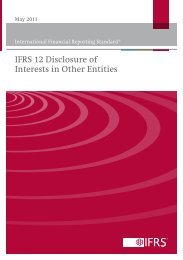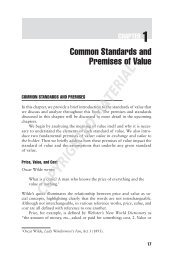ISSUE 5 2008 - Sweet & Maxwell
ISSUE 5 2008 - Sweet & Maxwell
ISSUE 5 2008 - Sweet & Maxwell
You also want an ePaper? Increase the reach of your titles
YUMPU automatically turns print PDFs into web optimized ePapers that Google loves.
400 Case & Comment [<strong>2008</strong>]<br />
restricted in any way in respect of the length of the sentence imposed. The result<br />
seems to be that if the offence itself is one which would not in any event attract a<br />
sentence of more than 12 months (the maximum term which may be suspended) a<br />
suspended sentence order with the appropriate community requirements may convey<br />
to the offender the consequences of a possible breach; but if the appropriate custodial<br />
sentence for the offence would be greater than 12 months, it is better for the court to<br />
impose a simple community order, leaving the question of the length of any custodial<br />
sentence to be imposed on the breach of the order to be decided, in the event that a<br />
breach does occur, by the court which deals with the breach.<br />
[D.A.T.]<br />
Confiscation order—amount that may be realised—agreement between prosecution and<br />
defence as to amount to be paid—whether agreement consistent with statute<br />
Agreements; Certificates of inadequacy; Confiscation orders; Drug trafficking;<br />
Proceeds of crime; Realisable property<br />
Telli v Revenue and Customs Prosecution Office<br />
Court of Appeal (Civil Division): Ward, Moore-Bick and Moses L.JJ.: December<br />
21, 2007; [2007] EWCA Civ 1385.<br />
In 1996 a confiscation order was made against the appellant under the Drug<br />
Trafficking Act 1994 in the amount of £3,458,806, with a term of 10 years’<br />
imprisonment in default, subsequently reduced on appeal to eight, and further<br />
reduced to 5.6 years following the payment of a portion of the sum ordered.<br />
The appellant applied for a certificate of inadequacy in accordance with the<br />
Drug Trafficking Act 1994 s.17, on the basis that a statue which formed part<br />
of the property found to be available to meet any confiscation order had been<br />
repatriated by the Turkish Government as a stolen antiquity. In the absence of<br />
any possibility of realising the value of the statue, the appellant contended that<br />
his realisable property was inadequate for the payment of the amount outstanding.<br />
The outstanding balance at the time of the application was approximately £1.9<br />
million. The application was refused by a judge of the High Court. The appellant<br />
appealed against the refusal of a certificate of inadequacy.<br />
Held, (Moses L.J.) the confiscation order was made in 1996 as a result of an<br />
agreement between the Crown and the appellant. It was contended for the Crown<br />
that the appellant had agreed to pay the sum of £3,458,806 without any agreement<br />
as to the assets which he held. On the basis of the agreement, the application for<br />
a certificate of inadequacy was refused on the ground that the original order was<br />
based on a compromise made on the understanding that the appellant accepted<br />
that he would find £3,458,806. The language of the judge refusing the certificate of<br />
inadequacy used the language of compromise, as if the agreement could be regarded<br />
as analogous to the compromise of a civil action. The appeal raised the question<br />
whether that analogy could be drawn in the context of the statutory scheme under<br />
which the confiscation order was made. The 1994 Act had now been repealed and<br />
replaced by the Proceeds of Crime Act 2002. The 1994 Act required the Crown<br />
Court to determine, first, whether the defendant had benefited from drug trafficking.<br />
If the court was satisfied that the defendant had benefited, the court was required<br />
to quantify the amount of the benefit in accordance with s.4. Certain assumptions<br />
© SWEET &MAXWELL






